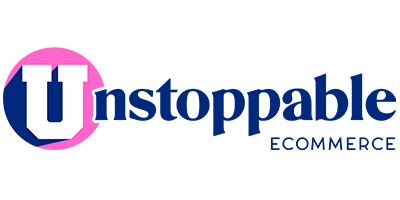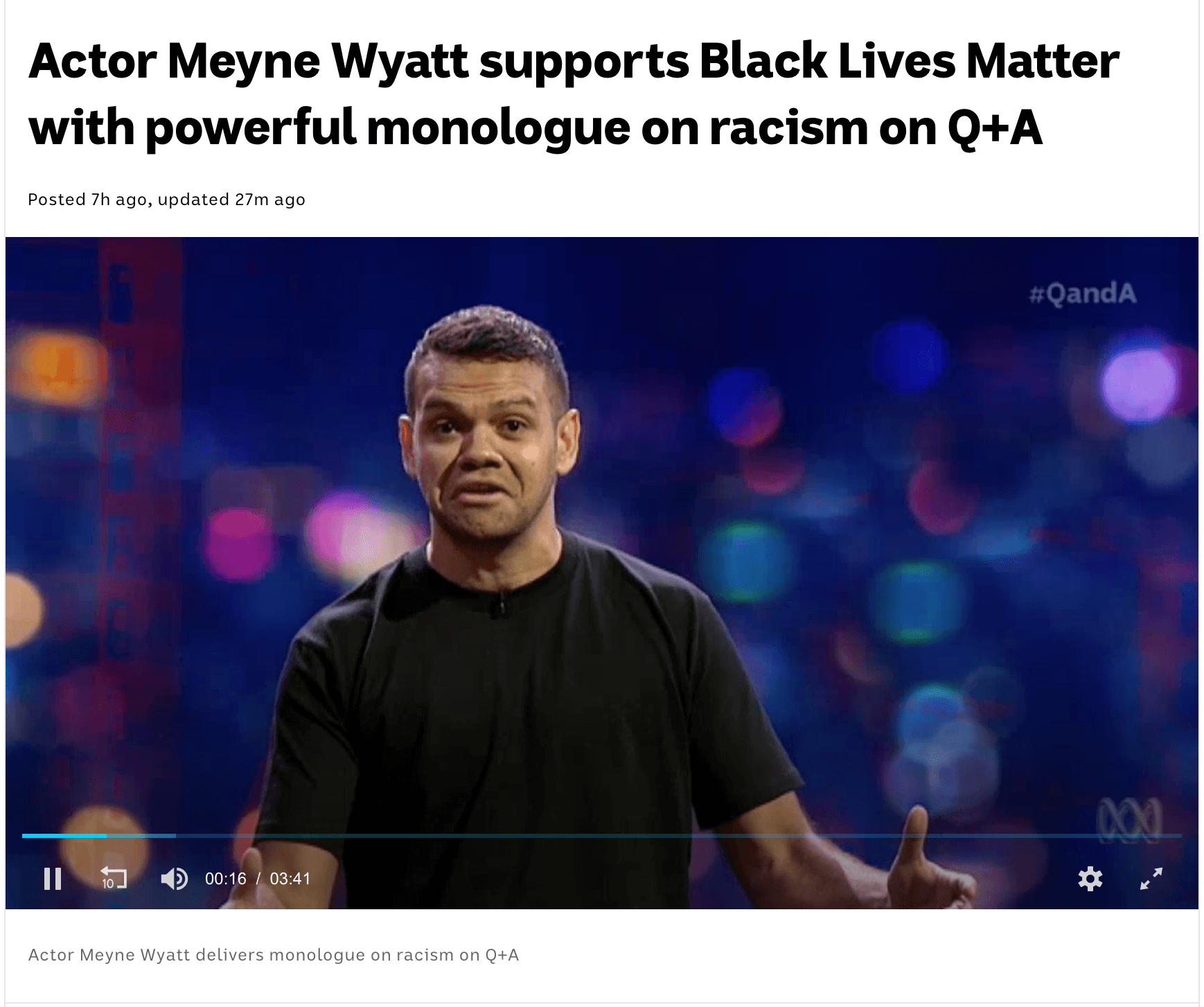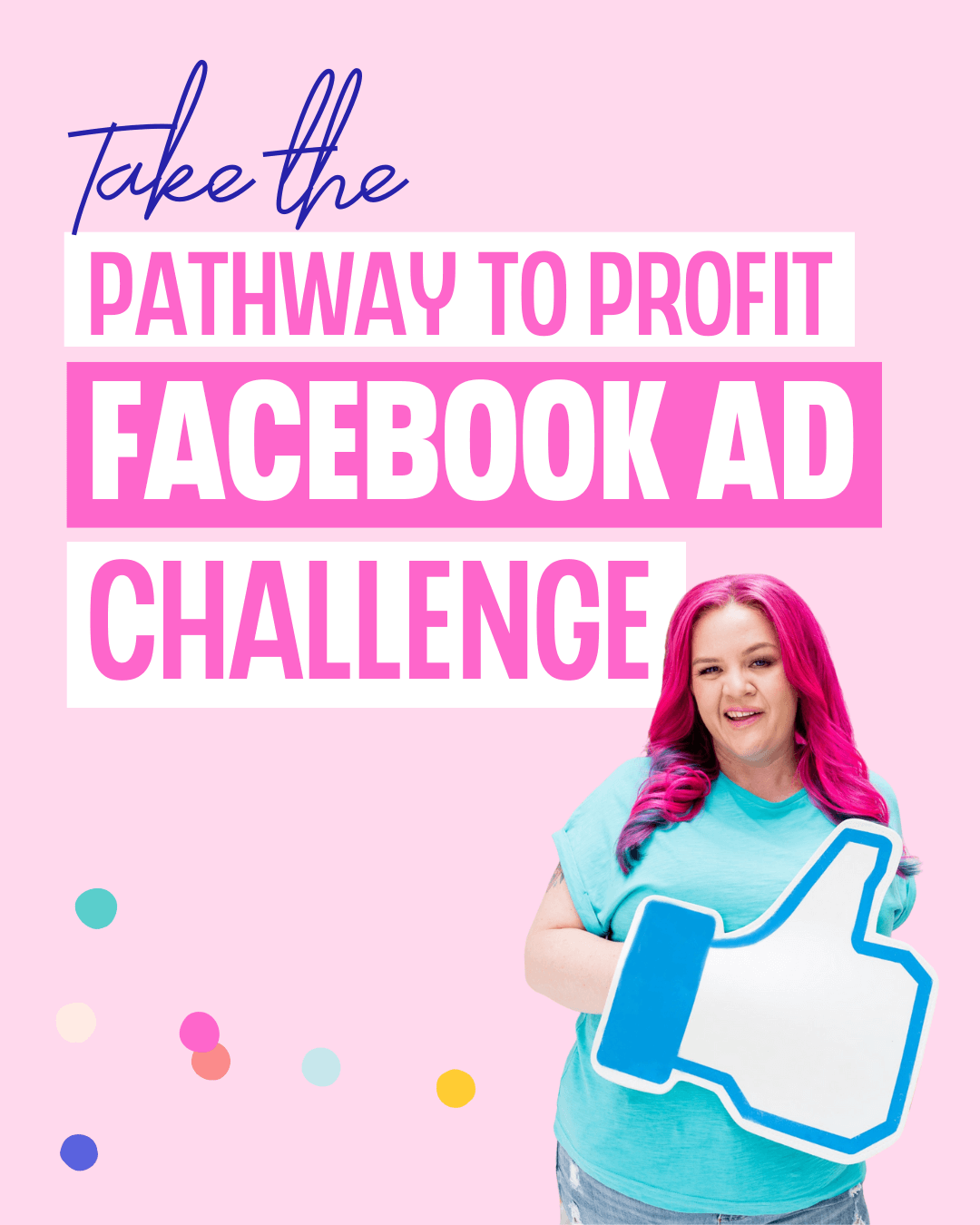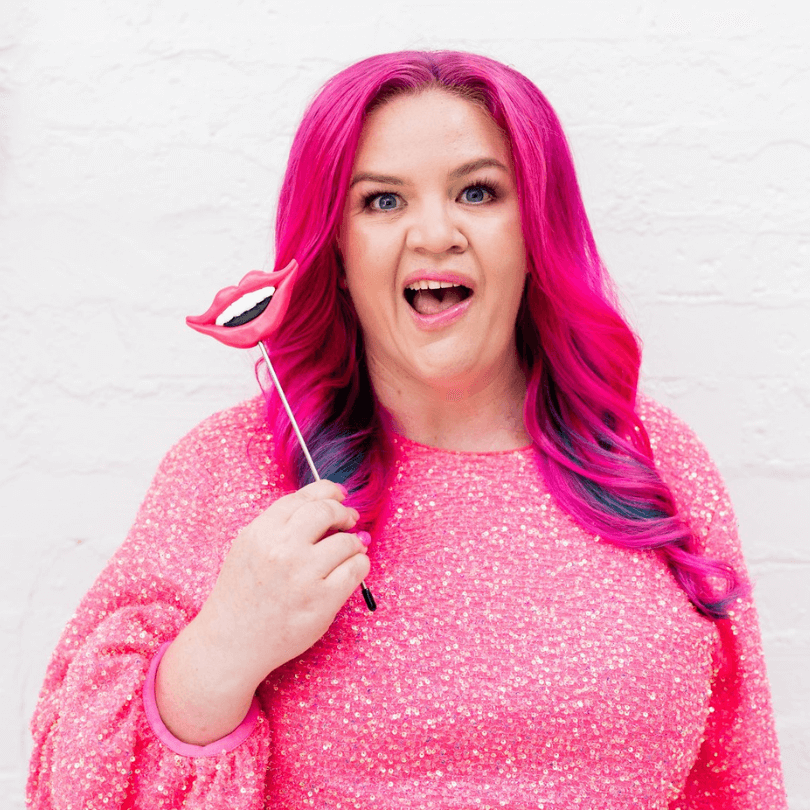When the bushfires hit Australia our community looked to us to guide them. They wanted to know if they should still continue business as usual, should they still post, should they run fundraisers for the bushfire victims, should they mention them or not, was it OK to still make money during a tragedy? These were all questions asked of us and we were able to guide them with answers to all of these. We found it easy to support them during this time.
Then Covid-19 hit and the same questions came, stores had to shut their brick and mortar locations and rely solely on their online stores and we were able to help them. We wrote a guide on how to thrive during the pandemic which helped many businesses.
The past week the questions came again, from clients wanting to know if they should stop all advertising to allow the Black Lives Matter movement to cut through… should they post about it… should they not… was it OK to continue on their business?
Our clients have been asking us:
- Do we need to pause our ads to give space to the BLM movement?
- Do we pause other social media messaging?
- Do we show our support and in what way would you suggest?
To be completely honest with you, our response was “we don’t know”.
So we spent the week learning, listening and leaning in.
We’re going to share what we learnt. This is not just an American issue, it’s very much an issue here in Australia too. We know there is still so much that we don’t know and we are truly dedicated to ensuring this is not a fleeting trend given a token response. And the more we learn, the more we learn there is more to learn.
And, at the same time as small business owners, we don’t have the luxury of shutting down for a day, a week or a month (or more) to allow this issue to pass. Keeping in mind, this issue is systemic and will not be solved any time soon.
So after taking the week to listen and observe this is what we have learned:
Before commenting publicly, look internally.
Michelle Obama said:
“It’s up to everyone—no matter how well-meaning we think we might be, to do the honest, uncomfortable work of rooting it out. It starts with self-examination and listening to those whose lives are different from our own.”
And to quote Bryana Allen’s comment on Cindy Gallop’s post:
“Before companies comment publicly, they need to take an honest look at themselves. They need to ask: What are we doing to support and promote diversity, equality, and inclusion at all levels with our organization? True change starts from within.”

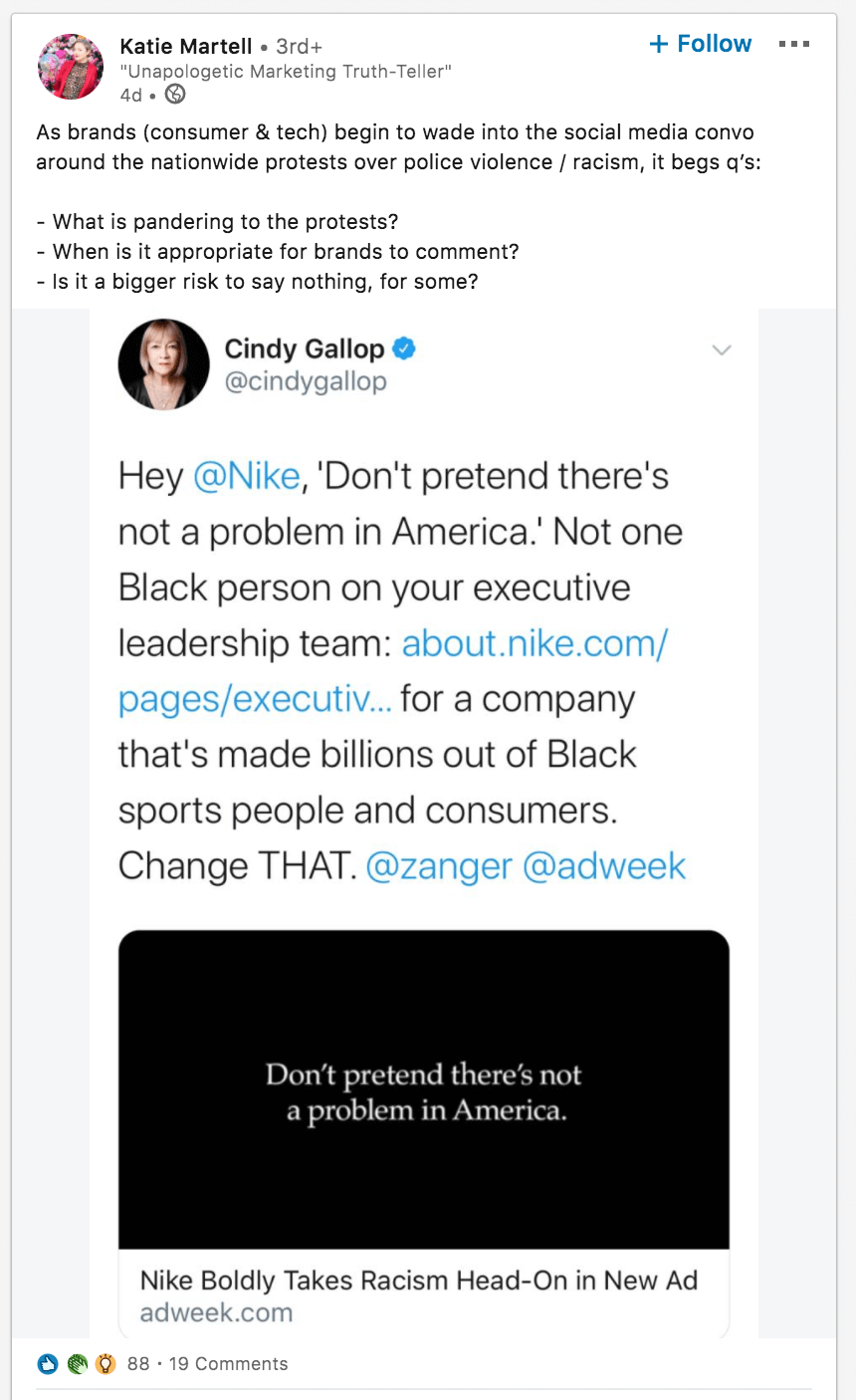
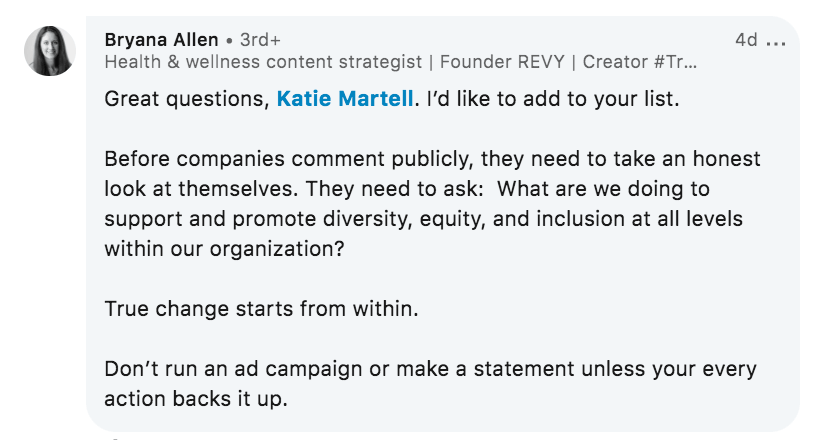
And @ohhappydani gave some really good points about how businesses can make real change. We recommend checking out her videos.
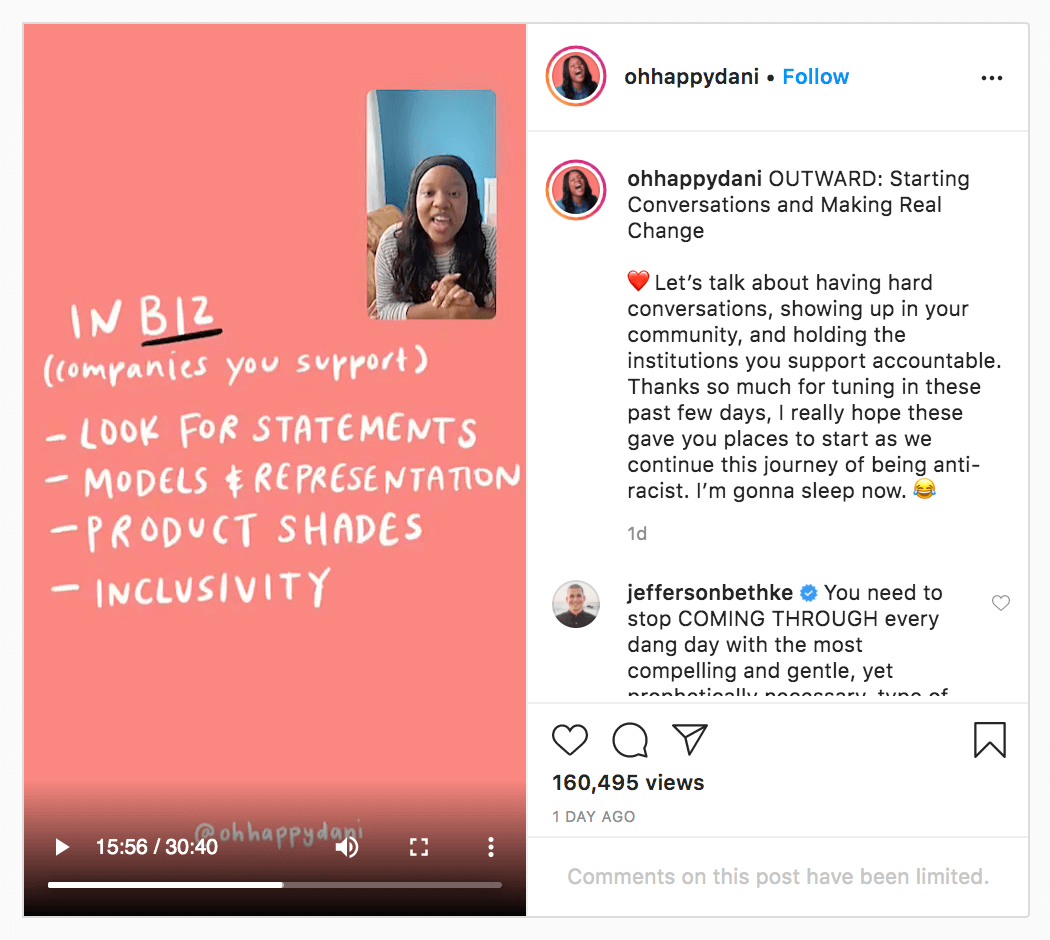
So what can we do as a business to show up with accountability and transparency?
1. Do Check Your Bias
www.implicit.harvard.edu provides an online tool where you can test your bias. They say:
“It is well known that people don’t always ‘speak their minds’, and it is suspected that people don’t always ‘know their minds’. Understanding such divergences is important to scientific psychology.”
2. Do Learn, Listen and Lean In
You are going to be presented with opportunities to learn, to listen and to lean in. There will be times when things feel messy, hard and awkward, and you won’t always get things right. We don’t. But we’re human and so are you.
3. Do Review Your Policies and Update if needed
Does your business have a code of conduct? Does it clearly state that racism will not be tolerated? Look around and see if that code of conduct is being lived and breathed.
4. Do Make Sure Your Products Represent Diversity
Are the products you produce inclusive? For example, if you produce kids dolls, do you sell dolls that are just white, and if so, how can you include dolls that represent different skin tones? If you sell makeup, does your pallet include shades for all skin tones? If you sell homewares, are indigenous artists represented in your store?
5. Do Take Steps To Make Your Marketing More Inclusive
Have a look at your image gallery. Do your models look the same? If not, be intentional about including models of all shapes, sizes and colours.
@triplejhack engaged @shannanjdodson to put together 10 positive ways to engage with indigenous issues.
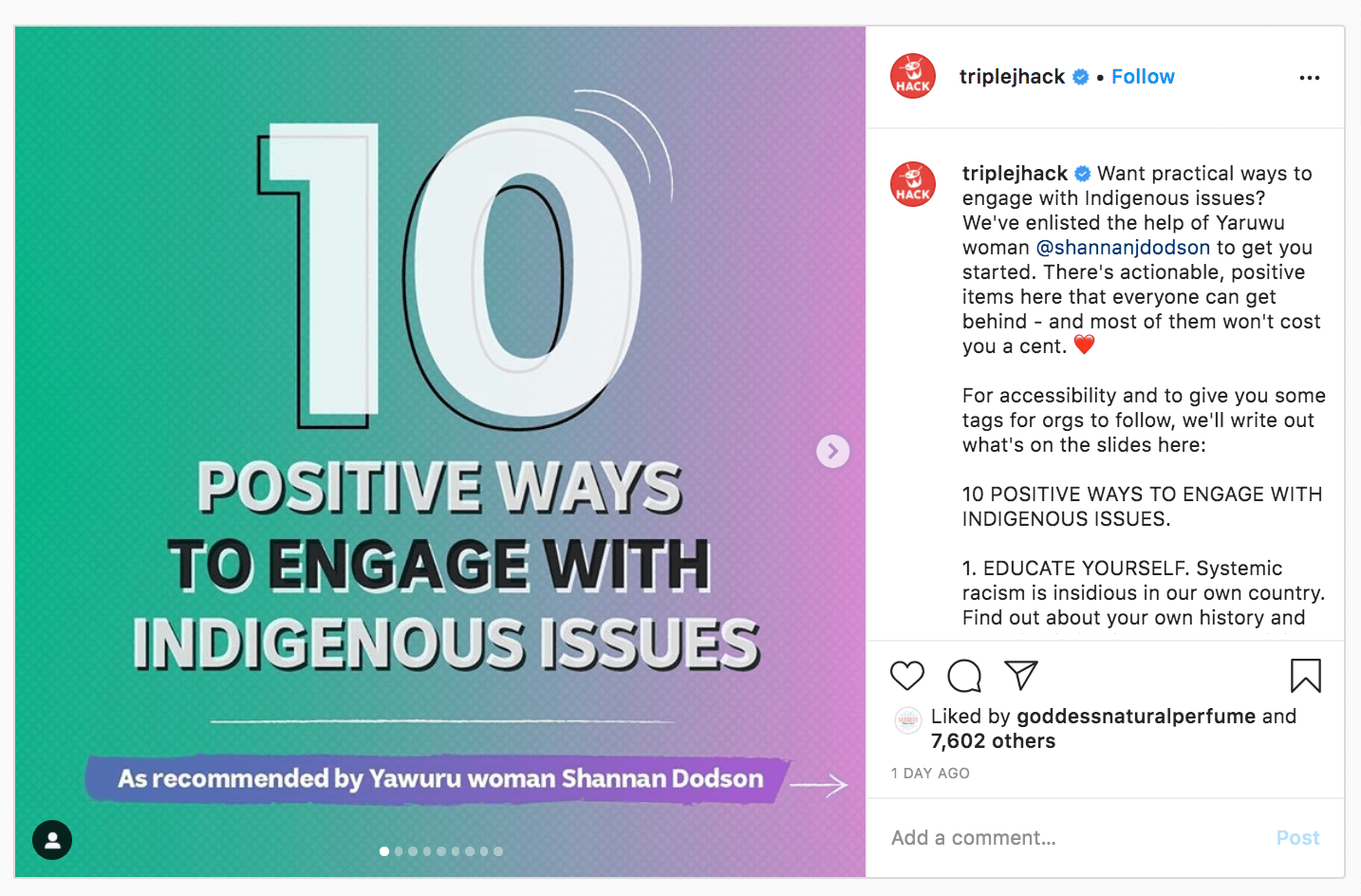
6. Do support other eCommerce owners
As eCommerce store owners we know how special it is to get a sale and we know our community loves to support others by shopping.
Here are some organisations promoting businesses with BIPOC owners you can support with your spending:
- Trading Blak – “Collective of Aboriginal business owners”
- Blak Business – “Bringing together info to make Aboriginal & Torres Strait Islander (𝙗𝙡𝙖𝙠) history, politics, voices, creators etc (𝙗𝙪𝙨𝙞𝙣𝙚𝙨𝙨) accessible to all”
7. Don’t be insensitive
If you are thinking of not promoting your business, ask yourself why? Is it because you don’t want to be insensitive? If this is the case, then the answer is simple.
Don’t be insensitive.
This doesn’t mean ceasing your business operations. It means not being insensitive in your actions and your communications.
Obviously, you don’t want to share anything that could be insensitive, triggering or offensive. For example, absolutely do not have a “Black Tuesday sale” or include linked emojis in your headlines.
8. Don’t be opportunistic
Don’t use the movement as a hook to try to generate PR. This will go down like a ton of bricks. “Opportunistic marketing” can be very effective, however, a movement/issue or crisis is not the time. Opportunistic marketing is simply leveraging a situation for the good of your brand. And in a time when emotions are high, we definitely don’t want this.
9. Don’t dilute the message
If you are going to use your communication channels as a platform to join the conversation, dedicate your entire post, email or video. Don’t try to make it about you or your product. By merging messages, both become diluted and confusing. And also a bit messy. Draw a line and keep it separate.
It’s ok to not use your business channels as a platform. Again, it’s ok to keep moving forward with your business. Just remember to be considerate in your actions, as outlined above.
Don’t make it all about you
Now is not the time to share your story about how you’ve witnessed racism. Absolutely journal about your own experiences and have candid conversations, but we don’t feel you should be turning the spotlight to yourself. That’s just making it all about you. Instead, listen to the stories of the BIPOC community.
Like Meyne Wyatt’s:
10. Don’t think your job is done with a single post
A token black tile is not enough. That’s “nice” but we can do better. And to be honest, after digging deeper, it feels like a lazy option.
If you have posted the black tile (like many of our team did on our personal accounts) understand that you have now taken a stand and you must keep standing. Standing requires action, not just words.
@shannanjdodson called it out by saying:
“Don’t just post a black square and take no action. Over 400 Indigenous people have died in police custody since 1991 – not one person has been charged. Injustice is happening here every day in our own country. Use this energy to reflect on your own prejudices, biases and privilege. Black/blak people are tired of doing the heavy lifting, use your voice and actions to shift systemic racism.
Do your research, donate, engage with Indigenous media and don’t let pride and uncomfortableness get in the way of hard conversations.”

11. Don’t post #alllivesmatter
We learnt “all lives matter” is offensive and insensitive to the current situation. One of the best analogies I’ve heard this week was this:
Imagine you are in your street and a house is on fire, you “say all houses matter” and pour water on all the houses, not just the one which is burning right now and needs your help.
@scarecrowbar puts in like this:
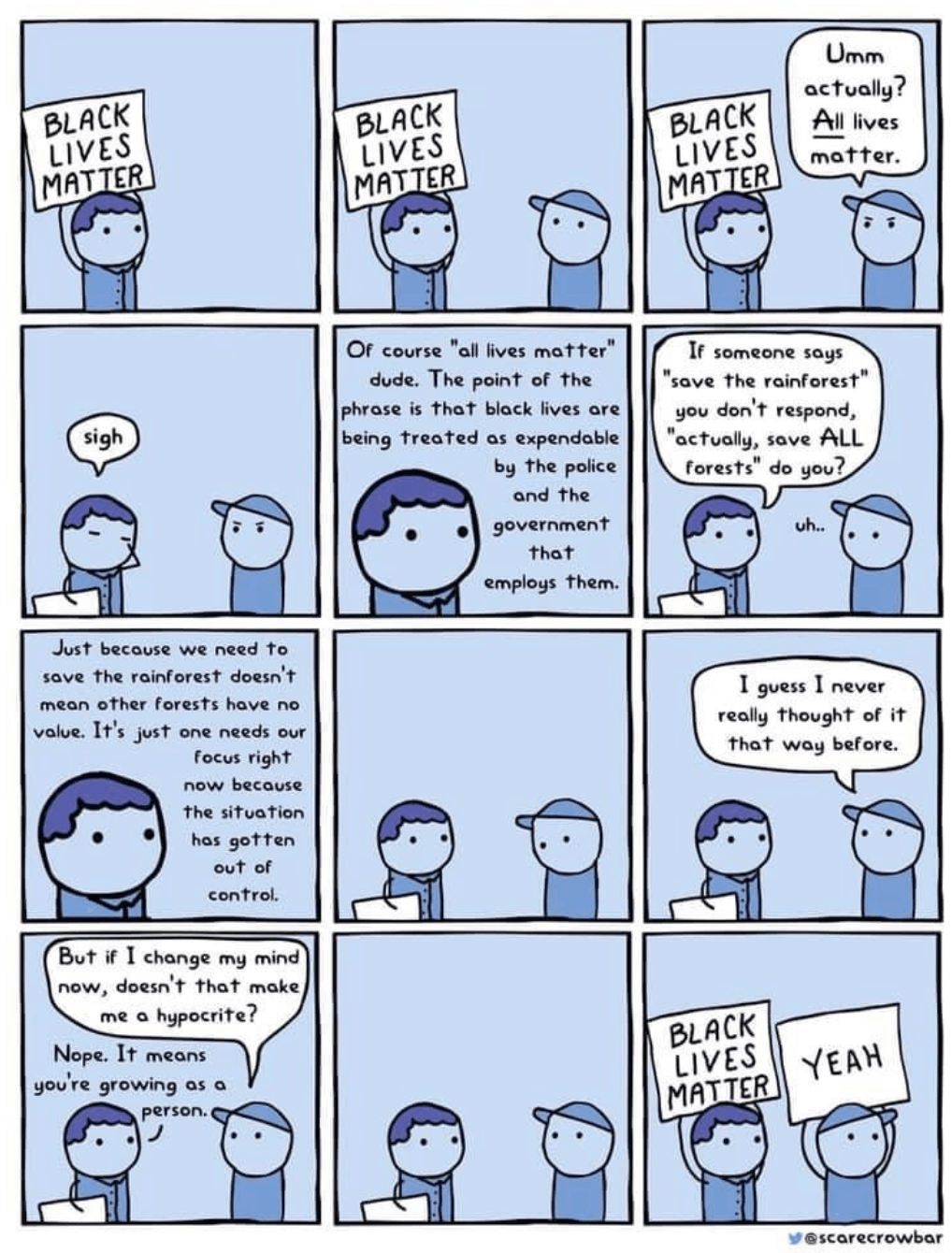
And @sarahwillsphoto shared this:
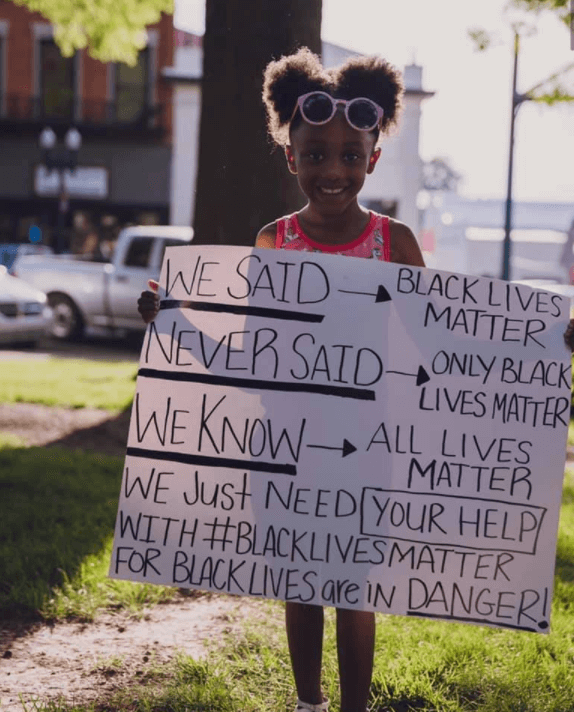
What to post on social media?
Now, let’s turn to the question of what to do on your social feed.
Again, we don’t really know.
There are mixed feelings on this. I asked in a closed group and some people said “yes, stop advertising” and some people said “it’s ok to keep going with business”.
In her address to the graduating class of Immaculate Heart High School Meghan Markle said:
“The only wrong thing to say is to say nothing”
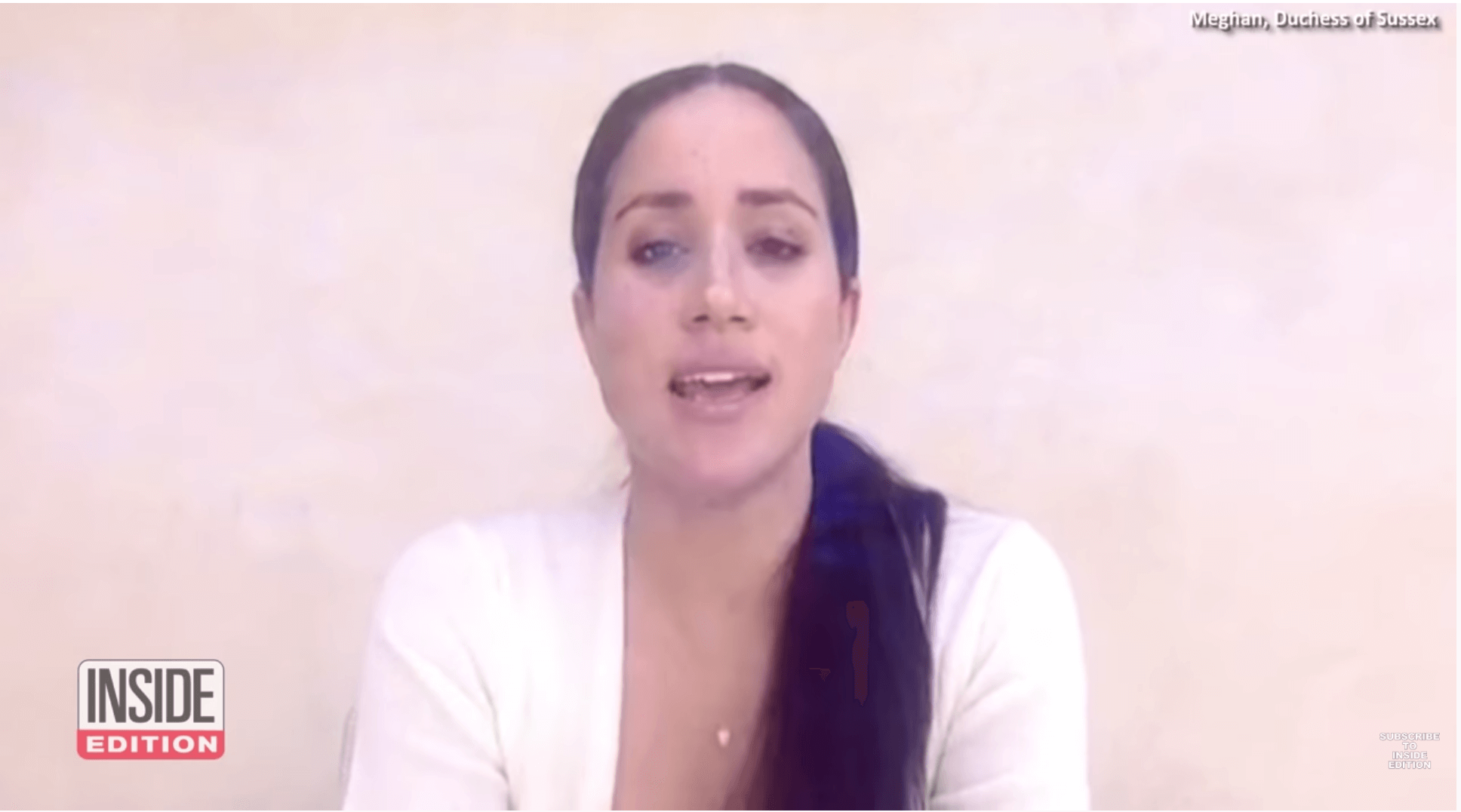
Some accounts put a pause on their social media accounts with the intention to allow others to appear in the newsfeed.
Some people, like Amy Porterfield, dedicated their feed to BIPOC voices. This feels nice, because it’s not making it all about you.
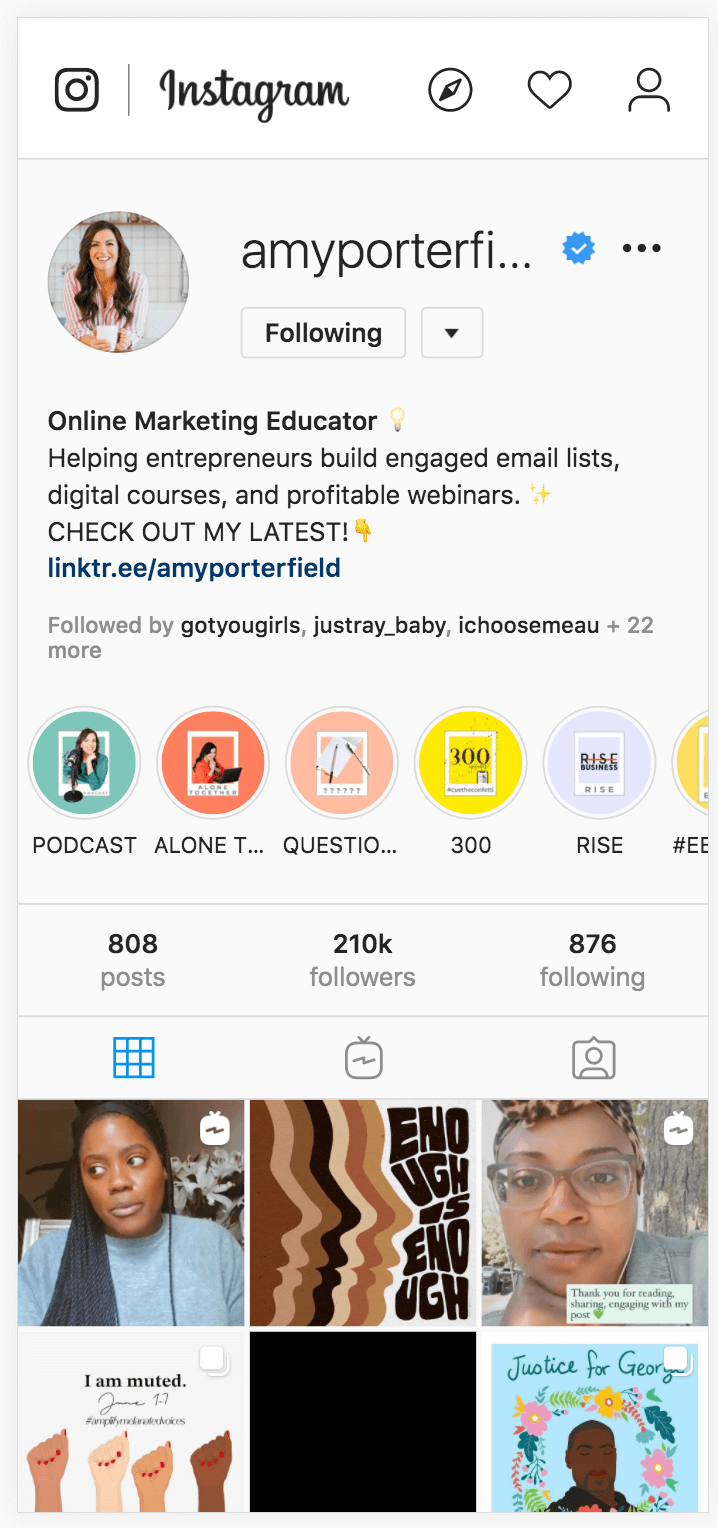
So to try to answer your questions, simply:
- Do we need to pause our ads to give space to the BLM movement? – No
- Do we pause other social media messaging – That’s your call
- Do we show our support and in what way would you suggest? – Follow your heart and be prepared to offend someone regardless of whatever you do or don’t do.
A final word. Follow your true north.
There is always going to be someone who is offended by what you say or what you do. That’s just human nature.
The most important thing is that you have to feel good about what you are doing and you have to live with the consequences of your actions. This goes for business at the best of times, not just when we are faced with this.
If someone criticises you for your actions, that says more about them then it does about you.
We’ll leave it here for now. If you have anything to add to this conversation, please reach out. We’re learning, listening and leaning in.
Megan and Karyn x
PS – If you’d like to continue your education here are some useful links:
The Southern Poverty Law Center is dedicated to fighting hate and bigotry and to seeking justice for the most vulnerable members of our society. Using litigation, education, and other forms of advocacy, the SPLC works toward the day when the ideals of equal justice and equal opportunity will be a reality.
The Aboriginal Legal Service does legal work in criminal law, children’s care and protection law and family law. We also support the development of wraparound programs and undertake broader policy and law reform work. We continue to fight for the rights of Aboriginal and Torres Strait Islander peoples in NSW and the ACT.
The Minnesota Freedom Fund pays criminal bail and immigration bond for those who cannot afford to as we seek to end discriminatory, coercive, and oppressive jailing.
The Black Lives Matter Foundation’s mission is to eradicate white supremacy and build local power to intervene in violence inflicted on Black communities by the state and vigilantes. By combating and countering acts of violence, creating space for Black imagination and innovation, and centering Black joy, we are winning immediate improvements in our lives.
The mission of the National Association for the Advancement of Colored People (NAACP) is to secure the political, educational, social, and economic equality of rights in order to eliminate race-based discrimination and ensure the health and well-being of all persons
Obama.org’s mission is to inspire, empower, and connect people to change their world.
And here are just a few podcasts to get you started:
